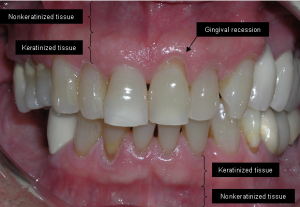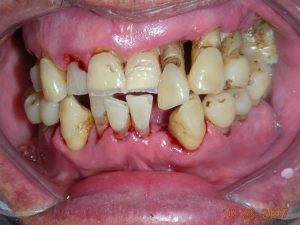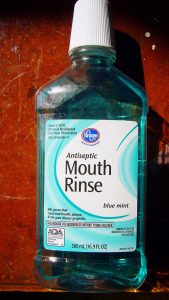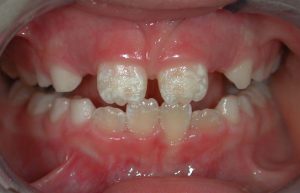Chronic Periodontitis: Causes, Symptoms & Treatment

Periodontitis is a gum infection that can eventually lead to a buildup of gingival crevicular fluid, gum disease, alveolar bone loss and attachment loss of the teeth, meaning they will fall out. Severe periodontitis requires periodontal treatment is required.
It is a common oral health problem but is almost entirely preventable. In most cases, you can eliminate the risk factor through diligent oral hygiene that includes brushing twice a day, flossing, and receiving routine dental checkups is enough to prevent periodontitis.
“If your teeth are important to you, you must take care of them throughout your entire lifetime. If you have neglected your teeth to the point depicted in the photograph, you need a new plan. Saving your teeth is no longer an option. Once teeth begin to move within your gums with light finger pressure, have become overly erupted, or have lost gum tissue allowing more than one-third of the tooth root to show, even the best periodontal specialist cannot save your teeth and return them to a state of health. For a lot of patients, this is a hard fact to accept. There is no second chance. It is time to discuss extractions and tooth replacement options to restore your smile.”
There are three different types of periodontitis, including:
- Chronic periodontitis, which is the most common and is caused by plaque buildup.
- Aggressive periodontitis, which is hereditary and causes rapid loss of bone and teeth if untreated.
- Necrotizing periodontal disease, which is the death of the gums, tooth ligaments, and bones due to lack of blood. It is typically linked to a suppressed immune system from cancer, HIV infections, or malnutrition.
Need periodontal help? Find a local periodontist using our website.
Chronic Periodontitis

The primary cause of chronic periodontitis is poor oral hygiene. Over time, plaque builds up and eventually leads to periodontitis. It begins when plaque is allowed to form on the teeth.
Everyone is at risk of plaque build-up. Whenever you eat starchy or sugary foods, these things interact with the bacteria that naturally exists in your mouth. By brushing and flossing regularly, you prevent a significant buildup of plaque, and regular routine dental visits take care of the little bit that is allowed to form.
Unfortunately, when you neglect your oral health, plaque hardens into tartar or calculus and remains on your teeth. Tartar can only be removed with a professional dental cleaning and it’s filled with bacteria. The longer it stays on your teeth the more damage it does and the more it contributes to periodontitis.
Plaque and tartar buildup cause gingivitis, a mild form of gum disease. It is characterized by inflammation and irritation of the gums around the base of the tooth. It’s possible to reverse gingivitis with routine dental care. However, if it’s left untreated, it eventually leads to periodontitis.
When this happens, pockets form between the gums and teeth and fill with plaque, tartar, and bacteria. Over time, the pockets deepen and fill with more and more bacteria, which damages the soft tissue and bone. Eventually, it can lead to the loss of teeth and it puts a strain on your body’s immune system, which puts you at risk for other medical issues.
Symptoms of periodontitis include:
Gum swelling or puffiness
- Bright red, dusky red, or purplish gums
- Tender gums
- Gums that bleed easily
- Receding gums
- Bad breath
- Chewing pain
- Space between teeth
- Pus between the teeth and gums
- Loosened teeth
- Changes in how teeth fit together in the mouth
What Increases Your Risk for Chronic Periodontitis?
- Poor gum health
- Poor oral hygiene
- Smoking
- Chewing tobacco
Hormonal changes, including those that occur in adolescences and during pregnancy and menopause
- Age
- Substance abuse
- Nutritional deficiencies
- Obesity
- Genetics
- Some medications, especially those that cause dry mouth
- Autoimmune disorders
- HIV/AIDS
Cancer treatment - Diabetes
- Rheumatoid arthritis
- Crohn’s disease
Complications of Periodontitis

Research has also shown that pregnant women with periodontitis tend to give birth prematurely more often and their babies are born with low birth weights. This could be due to the bacteria in the mother’s mount transferring to the baby during the third trimester.
Treating Periodontitis
It is possible to treat periodontitis, even if it’s advanced. Choosing not to treat periodontitis can lead to:
- Gum abscesses or boils
- Loosening of teeth
- Loss of teeth
- Damage to the bone and periodontal membrane surrounding tooth roots
- Receding gums

A deep cleaning, sometimes called scaling, is also a part of periodontitis treatment. During a scaling, the dental hygienist will scrape away plaque and tartar with a special instrument, and then polish your teeth the same as a routine cleaning.
Severe cases of periodontitis might require a prescription antibiotic to treat infected gums. The antibiotics given are typically a shorter course but comes with all the usual side effects of antibiotics. If you have any allergies to medicines or you are concerned about the side effects, make sure you speak with your dentist when he or she offer the prescription.
Periodontitis can be painful, especially if you are instructed to brush and floss more frequently. Your dentist can suggest pain relief methods to help, including over-the-counter pain medications and topical pain relief. There are also medicated toothpastes that can help ease sensitivity. The important thing is to not be deterred by the discomfort of taking better care of your oral health. The pain you experience while you heal will be worth it in the long run when you alleviate periodontitis.
Finally, it’s important to begin a smoking cessation plan if you smoke cigarettes or if you are addicted to any other type of tobacco product. Tobacco increases your risk for oral health problems, many of them very serious, and makes it more difficult to restore oral health after a bout with chronic periodontitis. Your dentist and/or primary healthcare provider can recommend support programs that can help you quit smoking and eliminate addiction to any other tobacco products.
Treating chronic periodontitis is essential for restoring and maintaining good oral health. It improves the life of your teeth and reduces the risk you’ll need tooth extraction or that your teeth will fall out naturally as you age.
If you need information about oral health care or you’re looking for a dentist, use our contact form or call us toll-free at the number provided for more information.
Check out our page for Finding a Holistic dentist near you!
Medically Fact-Checked & Written by Our Dental Editorial Team
You can read more about our editorial guidelines by clicking this link and learn more about the Emergency Dentists USA editorial team here.

 Gum swelling or puffiness
Gum swelling or puffiness Hormonal changes, including those that occur in adolescences and during pregnancy and menopause
Hormonal changes, including those that occur in adolescences and during pregnancy and menopause
